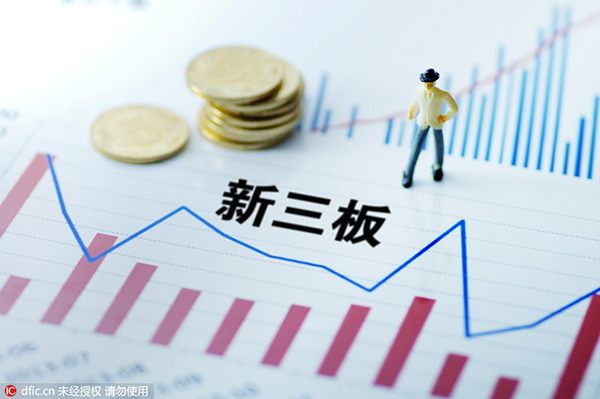More allowed to list on New Third Board
By Li Xiang (China Daily) Updated: 2016-05-28 07:54

More types of investment vehicles, including private equity and hedge funds, and venture capital firms, are to be allowed to conduct market-making business on the over-the-counter share trading market, the country's top securities regulator said on Friday.
The move is being seen as a further effort by the regulator to break the dominance by securities firms of the National Equities Exchange and Quotations, the nascent and rapidly growing share-trading market aimed at attracting small and medium-sized companies.
"It is a positive step as it will expand the number of market makers, improve the pricing of the marketplace, and better serve listed small and startup firms," said Zhang Xiaojun, the China Securities Regulatory Commission's spokesman.
The NEEQ market, better known as the New Third Board, has 88 market makers at present, all of which are securities firms, which act to "quote" buy and sell prices, and profit from the difference.
Observers said the expansion in the kind of financial institutions as market makers would increase competition, the transparency of pricing in the marketplace, and help address the problem of thin trading volume and low market liquidity.
The future expansion also coincided with an announcement that the regulator had resumed its approval of qualified financial institutions listing on the NEEQ market.
The regulator in January suspended the fundraising of financial institutions on the NEEQ market on concerns of fund misuse such as funneling capital for speculative trading in the stock market instead of sticking to their stated objective of investing it in small firms and startups.
On Friday, the NEEQ also released the final version of its much-anticipated plan to divide its listed companies into two segments: the innovative market and the basic market.
The commission first issued a draft regulation in March to solicit public opinion. It said the division will be based on a set of indicators of financial performance and shareholding structure of the listed companies, to ensure the relevant regulation is appropriately applied to them.
The regulator said it had revised the draft rules by improving the effectiveness of the requirement of listed firms to be qualified for the innovative market of the board.
Also on Friday, the Shanghai and Shenzhen stock exchanges streamlined their regulations on the trading suspension of listed companies, capping the maximum trading suspension period to three months for reasons of major asset restructuring by listed companies.
The move is intended to remove investor concerns of widespread suspensions in the A-share market, that had frozen liquidity during last summer's stock market rout.
Analysts said the new rules are likely to increase the chances of the A-share market being included in the MSCI Emerging Market Index, which will be announced on June 14.
- Several provincial-level regions unveil cuts in housing provident funds
- CNEC surges 44% on trading debut
- Truck Alliance on the road to Southeast Asia
- A 360-yuan juice cleansing, anyone? Or, how about a detox smoothie?
- Economic slowdown, or just a state of mind?
- Nutritious meals grow in popularity in Chinese cities
- App Annie chief says China market rocketing
- Jin Jiang wants bigger stake of Europe's AccorHotels

















